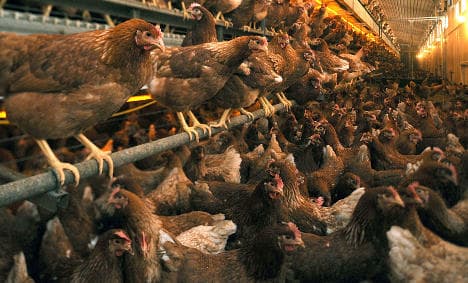Farms given all-clear in dioxin scare

About 3,000 German farms have been given the all-clear to reopen following the dioxin contamination scandal, but not all of Germany's states have managed to publish lists of affected eggs.
Out of the 4,700 German farms that were closed, "there are now only 1,470 farms barred from deliveries out of the about 4,400" in the region, Lower Saxony's agriculture ministry said in a statement released Sunday evening.
Data has been collected in cooperation with agricultural officials to allow for a "solid analysis" and "identify farms to be sure that products carry no risk for consumers," said the statement.
However, concerns are lingering about the way the scandal is being handled. Only three out of Germany’s 16 states – North Rhine-Westphalia, Rhineland-Palatinate and Hamburg – have published numbers of eggs they believe are contaminated with dioxin, Stefan Etgeton, health and nutrition expert from the Federation of German Consumer Organisations, told broadcaster ZDF on Monday.
“We need a unified communications strategy for the states,” he said.
All eggs in European Union countries must be stamped with a producers’ code. The number identifies the farming method – for example free range or barn-laid. It also specifies the country of origin, and the producer’s own code, which includes which state the farm lies in and in which barn the egg was laid.
Berlin, meanwhile, promised to take strict action ahead of talks aimed at preventing a repeat of the scandal.
South Korea, Slovakia and Russia have suspended sales or stepped up controls on food of animal origin from Germany.
Although German officials have said that none of the contaminated feed was exported, and just 136,000 eggs – annual output is 10 billion eggs – went abroad, Danish authorities on Sunday warned that poisoned feed may have entered Denmark.
"We know that one firm in Denmark has bought some feed from one of the German establishments, and that it could contain dioxin," said Kim Vandrup Sigsgaard, who heads the alert unit for food at the Danish Veterinary and Food Administration.
The feed was for animals not intended for human consumption. "It is for breeder hens (which) ... are not destined to be eaten," he said.
He said an investigation would be launched in Denmark and that it was not certain the German feed had been delivered to its Danish purchaser.
"I think it's in Denmark because it was purchased in November," he said.
Authorities were alerted to the purchase Sunday by a European Union food safety system, the Rapid Alert System for Food and Feed, Vandrup Sigsgaard added.
He could not name the German feed maker and said the Danish firm could not be identified until it had been notified.
AFP/DAPD/The Local/dw
Comments
See Also
Out of the 4,700 German farms that were closed, "there are now only 1,470 farms barred from deliveries out of the about 4,400" in the region, Lower Saxony's agriculture ministry said in a statement released Sunday evening.
Data has been collected in cooperation with agricultural officials to allow for a "solid analysis" and "identify farms to be sure that products carry no risk for consumers," said the statement.
However, concerns are lingering about the way the scandal is being handled. Only three out of Germany’s 16 states – North Rhine-Westphalia, Rhineland-Palatinate and Hamburg – have published numbers of eggs they believe are contaminated with dioxin, Stefan Etgeton, health and nutrition expert from the Federation of German Consumer Organisations, told broadcaster ZDF on Monday.
“We need a unified communications strategy for the states,” he said.
All eggs in European Union countries must be stamped with a producers’ code. The number identifies the farming method – for example free range or barn-laid. It also specifies the country of origin, and the producer’s own code, which includes which state the farm lies in and in which barn the egg was laid.
Berlin, meanwhile, promised to take strict action ahead of talks aimed at preventing a repeat of the scandal.
South Korea, Slovakia and Russia have suspended sales or stepped up controls on food of animal origin from Germany.
Although German officials have said that none of the contaminated feed was exported, and just 136,000 eggs – annual output is 10 billion eggs – went abroad, Danish authorities on Sunday warned that poisoned feed may have entered Denmark.
"We know that one firm in Denmark has bought some feed from one of the German establishments, and that it could contain dioxin," said Kim Vandrup Sigsgaard, who heads the alert unit for food at the Danish Veterinary and Food Administration.
The feed was for animals not intended for human consumption. "It is for breeder hens (which) ... are not destined to be eaten," he said.
He said an investigation would be launched in Denmark and that it was not certain the German feed had been delivered to its Danish purchaser.
"I think it's in Denmark because it was purchased in November," he said.
Authorities were alerted to the purchase Sunday by a European Union food safety system, the Rapid Alert System for Food and Feed, Vandrup Sigsgaard added.
He could not name the German feed maker and said the Danish firm could not be identified until it had been notified.
AFP/DAPD/The Local/dw
Join the conversation in our comments section below. Share your own views and experience and if you have a question or suggestion for our journalists then email us at [email protected].
Please keep comments civil, constructive and on topic – and make sure to read our terms of use before getting involved.
Please log in here to leave a comment.